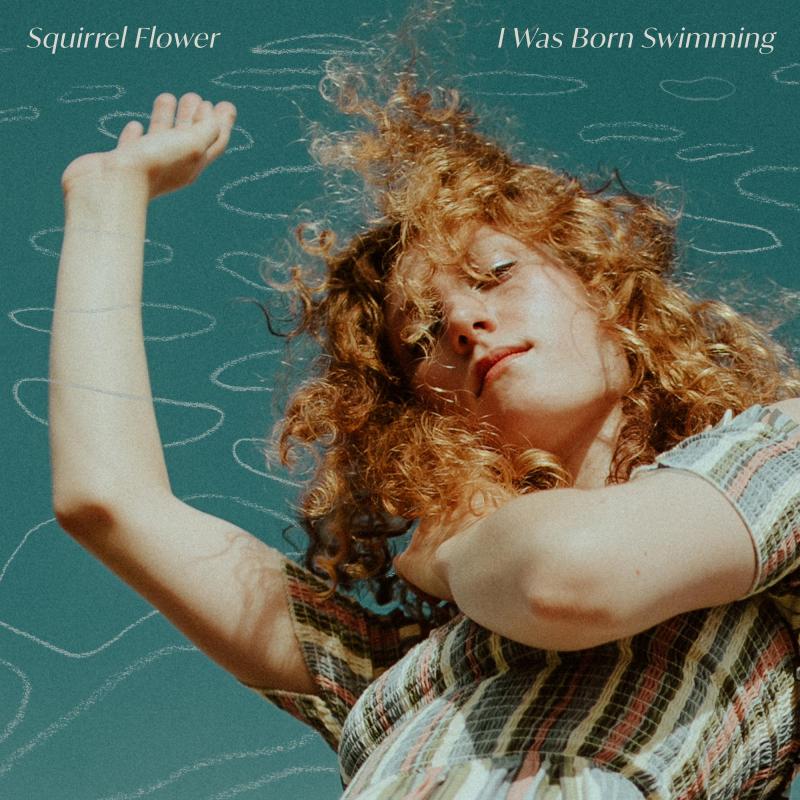Album: Squirrel Flower - I Was Born Swimming | reviews, news & interviews
Album: Squirrel Flower - I Was Born Swimming
Album: Squirrel Flower - I Was Born Swimming
Autobiography and poetry on mesmerising debut

The first album from the Boston-bred songwriter Squirrel Flower opens and closes with autobiographical songs. “I-80” opens with the artist - real name Ella O’Connor Williams - giving up on lyrics, poetry and, later, giving up on love, its rootless melody channelling the road west to Iowa where Williams went to college before building to a relentless crescendo.
There is both rooted and rootlessness to the music of Squirrel Flower: the project’s name was chosen in childhood and there are flashes of origin story throughout this gorgeous debut, but its recurring lyrical motifs are of restlessness and movement, night drives and open roads. “Headlights”, a mid-album highlight, combines stream-of-consciousness introspection with a rhythmic, delicate guitar, its regular glisten like the gleam of the dividing line zipping past. “Belly of the City” is full of quiet observations, Williams’ voice reverent, almost church-like as she watches: “Midnight workers, I know the darkness of these roads as well as you do.” And “Home” brings the two strands together, filled with warmth and sleepy childhood drives.
The album’s opening lines, in which “lyrics fail” Williams, are disproved time and again, from the observational poetry of “Belly of the City” to “Streetlight Blues”, in which the dying days of a relationship, and a summer, find their metaphorical match in the truncated life span of insects buzzing around street lights. But Williams’ truth is not always told in words, her poetry also reflected in Gabe Wax’s sparse production and the mesmeric touches of her instrumental collaborators (including her blues musician father Jesse on bass). “Seasonal Affective Disorder” is no less affecting for its minimal vocals while “Rush” is wild and sparse, gentle percussion doing almost as much of the heavy lifting as Williams’ always gorgeous voice. “I don’t know what I could do if not this,” she sings on “Slapback”, the album’s darkest point, and it feels both provocative and a promise.
Below: hear album standout track "Headlights"
rating
Share this article
The future of Arts Journalism
You can stop theartsdesk.com closing!
We urgently need financing to survive. Our fundraising drive has thus far raised £49,000 but we need to reach £100,000 or we will be forced to close. Please contribute here: https://gofund.me/c3f6033d
And if you can forward this information to anyone who might assist, we’d be grateful.

Subscribe to theartsdesk.com
Thank you for continuing to read our work on theartsdesk.com. For unlimited access to every article in its entirety, including our archive of more than 15,000 pieces, we're asking for £5 per month or £40 per year. We feel it's a very good deal, and hope you do too.
To take a subscription now simply click here.
And if you're looking for that extra gift for a friend or family member, why not treat them to a theartsdesk.com gift subscription?
more New music
 Sad and Beautiful World: Mavis Staples offers words of wisdom
Soul sister sings on
Sad and Beautiful World: Mavis Staples offers words of wisdom
Soul sister sings on
 theartsdesk on Vinyl 93: Led Zeppelin, Blawan, Sylvester, Zaho de Sagazan, Sabres of Paradise, Hot Chip and more
The most extensive, wide-ranging record reviews in the galaxy
theartsdesk on Vinyl 93: Led Zeppelin, Blawan, Sylvester, Zaho de Sagazan, Sabres of Paradise, Hot Chip and more
The most extensive, wide-ranging record reviews in the galaxy
 Suzanne Vega and Katherine Priddy, Royal Albert Hall review - superlative songwriters
Two brilliant voices fill the Royal Albert Hall
Suzanne Vega and Katherine Priddy, Royal Albert Hall review - superlative songwriters
Two brilliant voices fill the Royal Albert Hall
 Kali Malone and Drew McDowell generate 'Magnetism' with intergenerational ambience
Young composer and esoteric veteran achieve alchemical reaction in endless reverberations
Kali Malone and Drew McDowell generate 'Magnetism' with intergenerational ambience
Young composer and esoteric veteran achieve alchemical reaction in endless reverberations
 Benson Boone, O2 London review - sequins, spectacle and cheeky charm
Two hours of backwards-somersaults and British accents in a confetti-drenched spectacle
Benson Boone, O2 London review - sequins, spectacle and cheeky charm
Two hours of backwards-somersaults and British accents in a confetti-drenched spectacle
 Midlake's 'A Bridge to Far' is a tour-de-force folk-leaning psychedelic album
The Denton, Texas sextet fashions a career milestone
Midlake's 'A Bridge to Far' is a tour-de-force folk-leaning psychedelic album
The Denton, Texas sextet fashions a career milestone
 'Vicious Delicious' is a tasty, burlesque-rockin' debut from pop hellion Luvcat
Contagious yarns of lust and nightlife adventure from new pop minx
'Vicious Delicious' is a tasty, burlesque-rockin' debut from pop hellion Luvcat
Contagious yarns of lust and nightlife adventure from new pop minx
 Music Reissues Weekly: Hawkwind - Hall of the Mountain Grill
Exhaustive box set dedicated to the album which moved forward from the ‘Space Ritual’ era
Music Reissues Weekly: Hawkwind - Hall of the Mountain Grill
Exhaustive box set dedicated to the album which moved forward from the ‘Space Ritual’ era
 'Everybody Scream': Florence + The Machine's brooding sixth album
Hauntingly beautiful, this is a sombre slow burn, shifting steadily through gradients
'Everybody Scream': Florence + The Machine's brooding sixth album
Hauntingly beautiful, this is a sombre slow burn, shifting steadily through gradients
 Cat Burns finds 'How to Be Human' but maybe not her own sound
A charming and distinctive voice stifled by generic production
Cat Burns finds 'How to Be Human' but maybe not her own sound
A charming and distinctive voice stifled by generic production
 Todd Rundgren, London Palladium review - bold, soul-inclined makeover charms and enthrals
The wizard confirms why he is a true star
Todd Rundgren, London Palladium review - bold, soul-inclined makeover charms and enthrals
The wizard confirms why he is a true star

Add comment